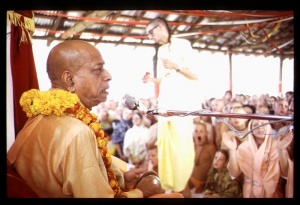SB 1.7.2: Difference between revisions
m (1 revision(s)) |
No edit summary |
||
| Line 1: | Line 1: | ||
{{info | {{info | ||
|speaker= | |speaker=Sūta Gosvāmī | ||
|listener= | |listener=Sages of Naimiṣāraṇya | ||
}} | }} | ||
[[Category:Srimad-Bhagavatam - Canto 01 Chapter 07|S02]] | |||
[[Category:Bhagavatam Verses Spoken by Suta Gosvami - Vanisource|010702]] | |||
<div style="float:left">'''[[Srimad-Bhagavatam]] - [[SB 1|First Canto]] - [[SB 1.7: The Son of Drona Punished|Chapter 7: The Son of Droṇa Punished]]'''</div> | |||
<div style="float:right">[[File:Go-previous.png|link=SB 1.7.1]] '''[[SB 1.7.1]] - [[SB 1.7.3]]''' [[File:Go-next.png|link=SB 1.7.3]]</div> | |||
{{CompareVersions|SB|1.7.2|SB 1962|SB 1972-77}} | |||
{{RandomImage}} | |||
==== TEXT 2 ==== | ==== TEXT 2 ==== | ||
<div | <div class="verse"> | ||
sūta uvāca | :sūta uvāca | ||
brahma-nadyāṁ sarasvatyām | :brahma-nadyāṁ sarasvatyām | ||
āśramaḥ paścime taṭe | :āśramaḥ paścime taṭe | ||
śamyāprāsa iti prokta | :śamyāprāsa iti prokta | ||
ṛṣīṇāṁ satra-vardhanaḥ | :ṛṣīṇāṁ satra-vardhanaḥ | ||
</div> | </div> | ||
| Line 18: | Line 24: | ||
==== SYNONYMS ==== | ==== SYNONYMS ==== | ||
<div | <div class="synonyms"> | ||
''sūtaḥ''—Śrī Sūta; ''uvāca''—said; ''brahma-nadyām''—on the bank of the river intimately related with ''Vedas, brāhmaṇas'', saints, and the Lord; ''sarasvatyām''—Sarasvatī; ''āśramaḥ''—cottage for meditation; ''paścime''—on the west; ''taṭe''—bank; ''śamyāprāsaḥ''—the place named Śamyāprāsa; ''iti''—thus; ''proktaḥ''—said to be; ''ṛṣīṇām''—of the sages; ''satra-vardhanaḥ''—that which enlivens activities. | |||
</div> | </div> | ||
| Line 25: | Line 31: | ||
==== TRANSLATION ==== | ==== TRANSLATION ==== | ||
<div | <div class="translation"> | ||
Śrī Sūta said: On the western bank of the River Sarasvatī, which is intimately related with the Vedas, there is a cottage for meditation at Śamyāprāsa which enlivens the transcendental activities of the sages. | Śrī Sūta said: On the western bank of the River Sarasvatī, which is intimately related with the Vedas, there is a cottage for meditation at Śamyāprāsa which enlivens the transcendental activities of the sages. | ||
</div> | </div> | ||
| Line 32: | Line 38: | ||
==== PURPORT ==== | ==== PURPORT ==== | ||
<div | <div class="purport"> | ||
For spiritual advancement of knowledge a suitable place and atmosphere are definitely required. The place on the western bank of the Sarasvatī is especially suitable for this purpose. And there is the āśrama of Vyāsadeva at Śamyāprāsa. Śrīla Vyāsadeva was a householder, yet his residential place is called an āśrama. An āśrama is a place where spiritual culture is always foremost. It does not matter whether the place belongs to a householder or a mendicant. The whole varṇāśrama system is so designed that each and every status of life is called an āśrama. This means that spiritual culture is the common factor for all. The brahmacārīs, the gṛhasthas, the vānaprasthas and the sannyāsīs all belong to the same mission of life, namely, realization of the Supreme. Therefore none of them are less important as far as spiritual culture is concerned. The difference is a matter of formality on the strength of renunciation. The sannyāsīs are held in high estimation on the strength of practical renunciation. | For spiritual advancement of knowledge a suitable place and atmosphere are definitely required. The place on the western bank of the Sarasvatī is especially suitable for this purpose. And there is the ''āśrama'' of Vyāsadeva at Śamyāprāsa. Śrīla Vyāsadeva was a householder, yet his residential place is called an ''āśrama''. An ''āśrama'' is a place where spiritual culture is always foremost. It does not matter whether the place belongs to a householder or a mendicant. The whole ''varṇāśrama'' system is so designed that each and every status of life is called an ''āśrama''. This means that spiritual culture is the common factor for all. The ''brahmacārīs'', the ''gṛhasthas'', the ''vānaprasthas'' and the ''sannyāsīs'' all belong to the same mission of life, namely, realization of the Supreme. Therefore none of them are less important as far as spiritual culture is concerned. The difference is a matter of formality on the strength of renunciation. The ''sannyāsīs'' are held in high estimation on the strength of practical renunciation. | ||
</div> | </div> | ||
__NOTOC__ | |||
<div style="float:right; clear:both;">[[File:Go-previous.png|link=SB 1.7.1]] '''[[SB 1.7.1]] - [[SB 1.7.3]]''' [[File:Go-next.png|link=SB 1.7.3]]</div> | |||
__NOTOC__ | |||
__NOEDITSECTION__ | |||
Revision as of 09:50, 30 April 2021

A.C. Bhaktivedanta Swami Prabhupada
TEXT 2
- sūta uvāca
- brahma-nadyāṁ sarasvatyām
- āśramaḥ paścime taṭe
- śamyāprāsa iti prokta
- ṛṣīṇāṁ satra-vardhanaḥ
SYNONYMS
sūtaḥ—Śrī Sūta; uvāca—said; brahma-nadyām—on the bank of the river intimately related with Vedas, brāhmaṇas, saints, and the Lord; sarasvatyām—Sarasvatī; āśramaḥ—cottage for meditation; paścime—on the west; taṭe—bank; śamyāprāsaḥ—the place named Śamyāprāsa; iti—thus; proktaḥ—said to be; ṛṣīṇām—of the sages; satra-vardhanaḥ—that which enlivens activities.
TRANSLATION
Śrī Sūta said: On the western bank of the River Sarasvatī, which is intimately related with the Vedas, there is a cottage for meditation at Śamyāprāsa which enlivens the transcendental activities of the sages.
PURPORT
For spiritual advancement of knowledge a suitable place and atmosphere are definitely required. The place on the western bank of the Sarasvatī is especially suitable for this purpose. And there is the āśrama of Vyāsadeva at Śamyāprāsa. Śrīla Vyāsadeva was a householder, yet his residential place is called an āśrama. An āśrama is a place where spiritual culture is always foremost. It does not matter whether the place belongs to a householder or a mendicant. The whole varṇāśrama system is so designed that each and every status of life is called an āśrama. This means that spiritual culture is the common factor for all. The brahmacārīs, the gṛhasthas, the vānaprasthas and the sannyāsīs all belong to the same mission of life, namely, realization of the Supreme. Therefore none of them are less important as far as spiritual culture is concerned. The difference is a matter of formality on the strength of renunciation. The sannyāsīs are held in high estimation on the strength of practical renunciation.